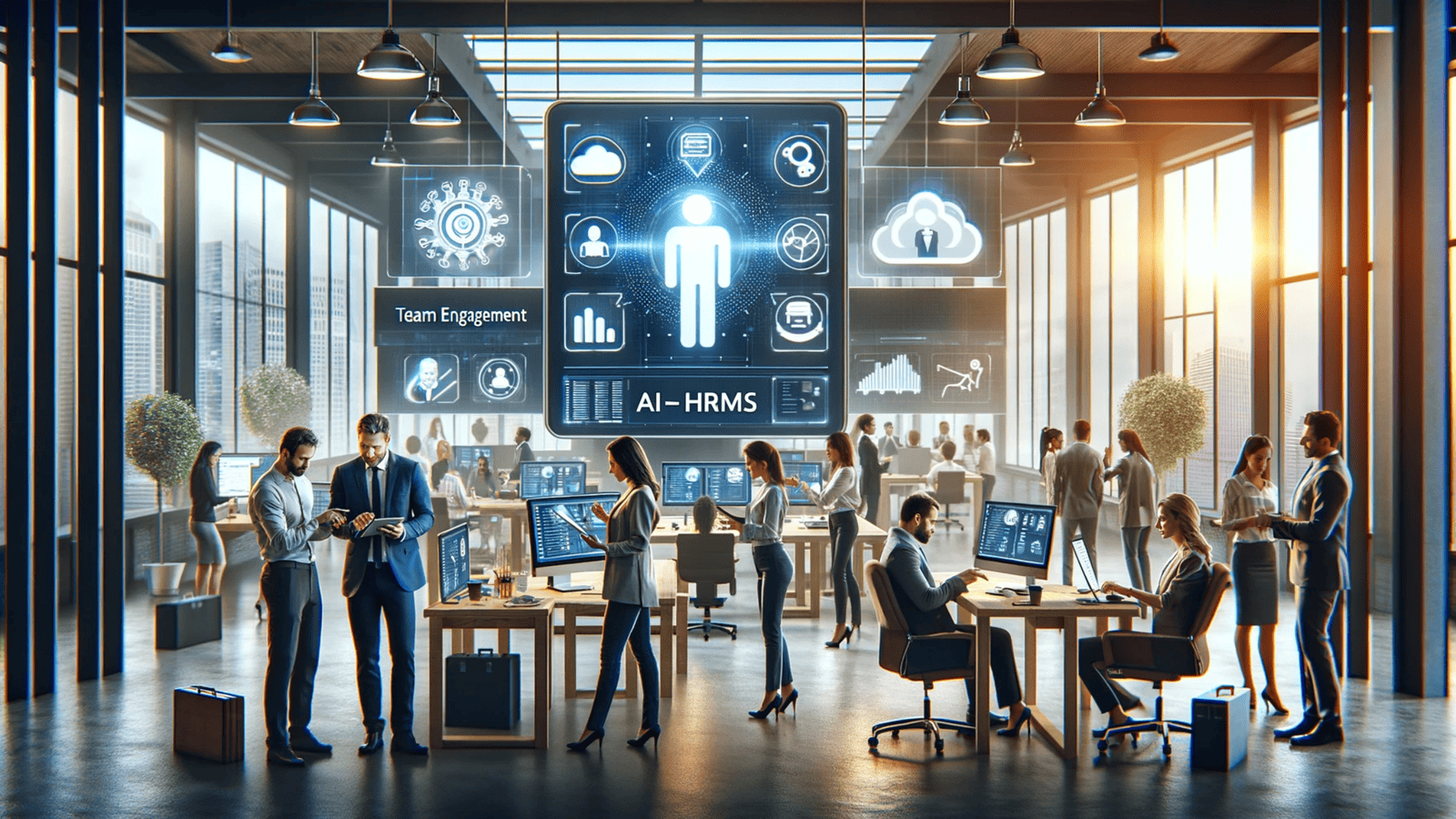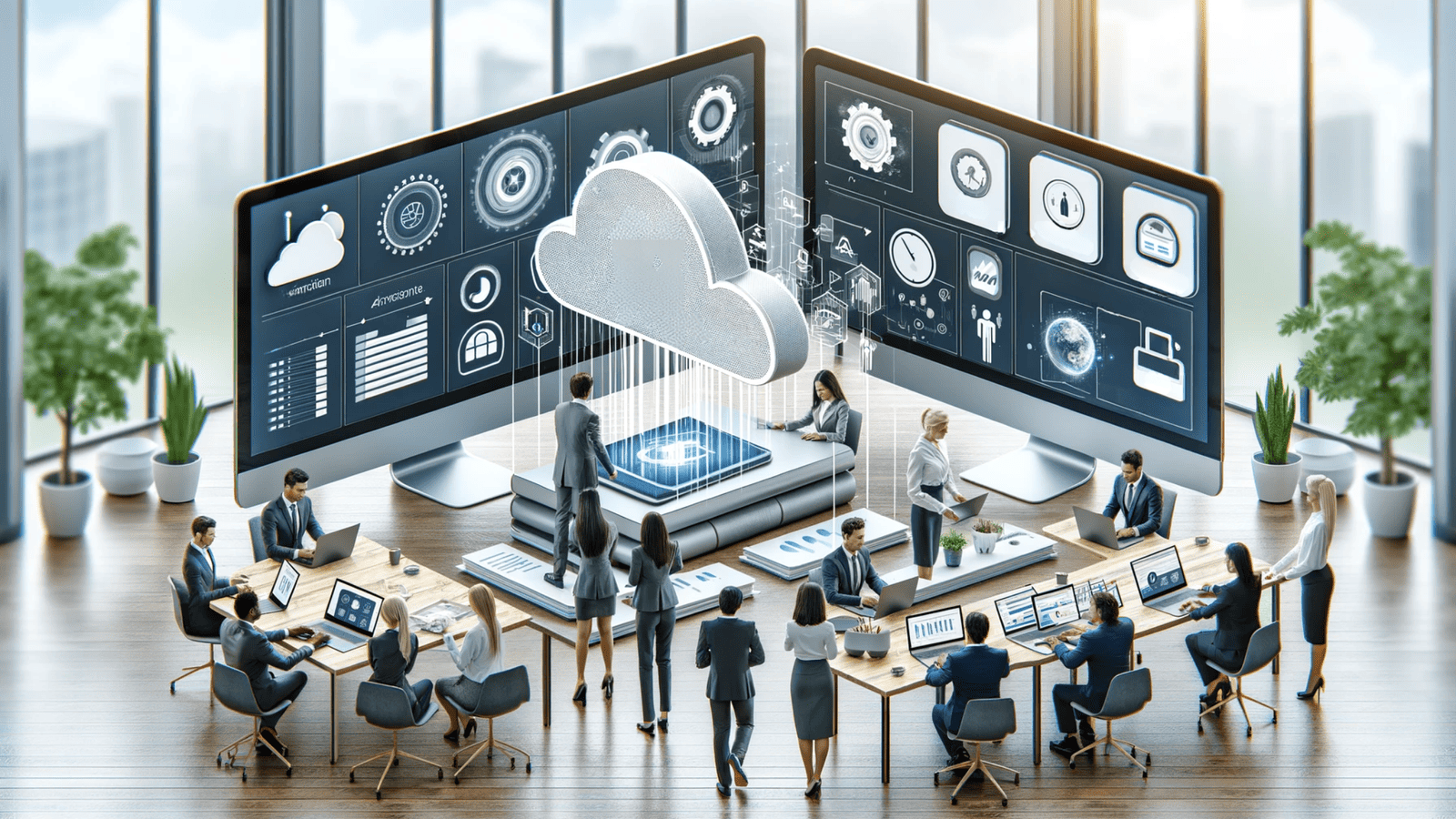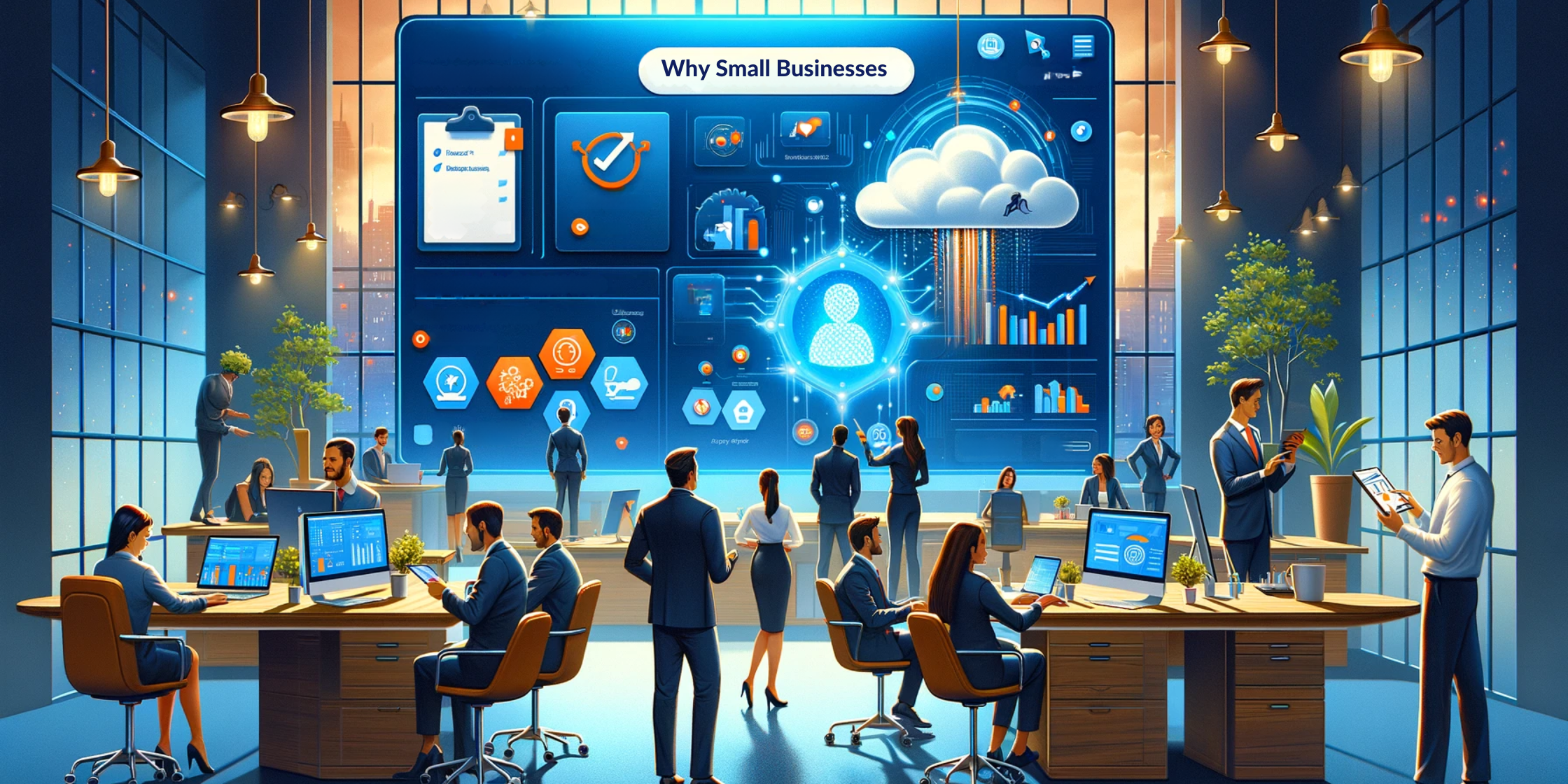Small businesses face unique challenges when it comes to managing their human resources. Limited resources and a small team make it difficult to handle HR processes efficiently. However, with the advent of AI HRMS (Artificial Intelligence Human Resource Management Systems), small businesses now have access to advanced technology that can streamline their HR operations and provide numerous benefits. In this article, we will explore why small businesses need AI HRMS and the key advantages it offers.
Key Takeaways
- AI HRMS can streamline HR processes and improve efficiency.
- It can enhance recruitment and onboarding processes for small businesses.
- AI HRMS can improve employee engagement and satisfaction.
- It helps optimize performance management and identify areas for improvement.
- Implementing AI HRMS can reduce administrative costs and minimize human error.
The Benefits of AI HRMS for Small Businesses

Streamlining HR Processes
Streamlining HR processes is crucial for small businesses to ensure efficiency and productivity. By implementing an AI HRMS, businesses can automate repetitive tasks such as payroll processing, time tracking, and leave management. This not only saves time but also reduces the chances of errors that can occur with manual data entry.
Additionally, an AI HRMS can centralize employee data, making it easily accessible and organized. This allows HR professionals to quickly retrieve information and generate reports, enabling them to make data-driven decisions. With the ability to automate workflows and generate reminders, an AI HRMS ensures that important HR tasks are not overlooked.
Furthermore, an AI HRMS can provide self-service options for employees, allowing them to update their personal information, request time off, and access HR policies and documents. This empowers employees and reduces the administrative burden on HR staff.
In summary, implementing an AI HRMS streamlines HR processes, improves efficiency, and empowers both HR professionals and employees.
Improving Recruitment and Onboarding
Improving recruitment and onboarding is crucial for small businesses to attract and retain top talent. With AI HRMS, companies can streamline these processes and provide the best possible experience for new hires. Some of the key features include:
- Employee Onboarding: AI HRMS allows for customizable profile templates and modules like absence management, asset tracking, and employee onboarding.
- Employee Wellness: AI HRMS offers a comprehensive health program aimed at maintaining or improving well-being, with the ability to disseminate information through various channels.
- Employee Training: AI HRMS helps create orientation plans to assist new employees in quickly adjusting to their roles.
- Employee 360 Feedbacks: AI HRMS provides immediate feedback to help employees improve their performance instantly.
By leveraging AI technology, small businesses can enhance their recruitment and onboarding processes, ensuring a smooth transition for new hires and increasing employee satisfaction.
Enhancing Employee Engagement
Employee engagement is crucial for the success of any organization. It refers to the level of commitment and enthusiasm employees have towards their work and the company. Engaged employees are more productive, motivated, and loyal, leading to higher levels of customer satisfaction and business growth.
To enhance employee engagement, small businesses can implement various strategies, including:
- Regular communication and feedback: Establishing open lines of communication and providing regular feedback helps employees feel valued and heard. This can be done through team meetings, one-on-one check-ins, or anonymous suggestion boxes.
- Recognition and rewards: Recognizing and rewarding employees for their hard work and achievements boosts morale and motivation. This can include verbal praise, certificates, or small incentives.
- Professional development opportunities: Offering opportunities for learning and growth, such as training programs or mentorship, shows employees that their development is valued.
Tip: Encourage a positive work culture by fostering collaboration, promoting work-life balance, and creating opportunities for social interaction among employees.
Optimizing Performance Management
Performance management is a crucial aspect of running a successful business. It involves setting clear goals, providing regular feedback, and evaluating employee performance. With AI HRMS, small businesses can streamline and optimize their performance management processes. Here are some key benefits:
- Improved Goal Setting: AI HRMS can help small businesses set SMART (Specific, Measurable, Achievable, Relevant, Time-bound) goals for their employees, ensuring alignment with overall business objectives.
- Real-time Feedback: AI HRMS enables managers to provide timely feedback to employees, allowing them to make necessary improvements and adjustments in real time.
- Data-driven Evaluations: By leveraging AI algorithms, HRMS can analyze performance data and provide objective evaluations, reducing bias and subjectivity.
Tip: Regularly reviewing and updating performance goals and providing ongoing feedback can significantly enhance employee performance and engagement.
Implementing AI HRMS for performance management can lead to more effective and efficient processes, ultimately driving better business outcomes.
AI HRMS: A Cost-Effective Solution for Small Businesses

Reducing Administrative Costs
AI HRMS offers several features that help small businesses reduce administrative costs. One of these features is the Daily Check-in/Check Out (Timesheet) module, which provides daily time tracking for employees. This module allows businesses to easily track employee working hours, including shortages and extra hours. By having accurate time tracking, businesses can ensure that employees are paid correctly and can identify any inefficiencies in their workforce.
Another feature offered by AI HRMS is Employee Equipment Record Keeping. This feature helps businesses keep track of their equipment records in a neat and orderly manner. By having a centralized system for equipment records, businesses can easily locate and manage their equipment, reducing the time and effort spent on administrative tasks.
With these features, AI HRMS enables small businesses to streamline their administrative processes and reduce the associated costs.
Minimizing Human Error
AI HRMS plays a crucial role in minimizing human error in HR processes. By automating repetitive and manual tasks, such as data entry and payroll calculations, AI HRMS reduces the chances of errors caused by human oversight or fatigue. This not only improves the accuracy of HR data but also saves time and resources.
In addition, AI HRMS provides built-in validation checks and error alerts, ensuring that HR processes comply with company policies and legal regulations. This helps to prevent costly mistakes and potential legal issues.
To further enhance accuracy, AI HRMS utilizes advanced algorithms and machine learning techniques to analyze data and identify patterns. This enables HR professionals to make data-driven decisions and minimize the risk of errors or biases in decision-making.
Overall, AI HRMS acts as a reliable and efficient tool for minimizing human error and ensuring the integrity of HR processes.
Increasing Operational Efficiency
AI HRMS offers a range of features and functionalities that can greatly enhance the operational efficiency of small businesses. By automating manual tasks and streamlining processes, AI HRMS allows businesses to save time and resources, enabling them to focus on more strategic initiatives.
One of the key ways AI HRMS improves operational efficiency is through the automation of administrative tasks. This includes tasks such as employee onboarding, leave management, and asset tracking. By automating these processes, businesses can reduce the time and effort required to complete them, freeing up valuable resources.
Additionally, AI HRMS helps minimize human error by eliminating manual data entry and ensuring accurate and consistent data management. This reduces the risk of errors and discrepancies, leading to more reliable and efficient HR processes.
Furthermore, AI HRMS enables small businesses to optimize their workforce management by providing real-time insights and analytics. By analyzing HR metrics and predicting workforce trends, businesses can make data-driven decisions to improve productivity and performance.
In summary, AI HRMS is a powerful tool that can significantly increase the operational efficiency of small businesses. By automating administrative tasks, minimizing human error, and providing data-driven insights, AI HRMS empowers businesses to streamline their HR processes and focus on strategic growth.
AI HRMS: Ensuring Compliance and Security

Automating Compliance Processes
Automating compliance processes is a key benefit of AI HRMS for small businesses. By leveraging artificial intelligence, businesses can ensure that their HR processes are in line with legal and regulatory requirements. Compliance with laws such as the Fair Labor Standards Act (FLSA) and the Family and Medical Leave Act (FMLA) is crucial for small businesses to avoid penalties and legal issues.
One way AI HRMS automates compliance is by automatically tracking and managing employee hours and leave. This reduces the risk of errors and ensures that businesses are accurately calculating overtime pay and providing employees with the appropriate leave entitlements.
In addition, AI HRMS can generate compliance reports that provide a comprehensive overview of the organization’s adherence to various regulations. These reports can be used for internal audits or to demonstrate compliance to external stakeholders.
Overall, automating compliance processes through AI HRMS helps small businesses stay on top of legal requirements and minimize the risk of non-compliance.
Protecting Employee Data
In an era where data breaches and privacy concerns are on the rise, protecting employee data has become a top priority for small businesses. With an AI HRMS, businesses can ensure the security and confidentiality of sensitive employee information.
One way AI HRMS protects employee data is through encryption. By encrypting data, businesses can prevent unauthorized access and ensure that only authorized personnel can view and modify sensitive information.
Additionally, AI HRMS platforms often have built-in access controls. These controls allow businesses to define who can access certain data and what actions they can perform. This helps prevent unauthorized individuals from accessing or tampering with employee data.
To further enhance data security, AI HRMS platforms also offer regular backups. By regularly backing up employee data, businesses can minimize the risk of data loss in the event of a system failure or cyber attack.
In summary, AI HRMS not only streamlines HR processes and improves efficiency but also provides robust measures to protect employee data and ensure data privacy.
Ensuring Data Privacy
Data privacy is of utmost importance in today’s digital age. With the increasing amount of sensitive employee information stored in HR systems, small businesses need to prioritize the security and confidentiality of this data. AI HRMS offers robust data protection measures to ensure that employee information is safeguarded against unauthorized access or breaches.
To maintain data privacy, AI HRMS employs encryption techniques to secure data both in transit and at rest. This means that information is encrypted when it is being transmitted between devices or stored in databases, making it difficult for hackers to intercept or decipher the data.
In addition to encryption, AI HRMS also implements strict access controls. Only authorized personnel with the necessary permissions can access and modify employee data. This helps prevent unauthorized individuals from viewing or tampering with sensitive information.
Furthermore, AI HRMS regularly undergoes security audits and updates to address any vulnerabilities and ensure compliance with data privacy regulations. By staying up-to-date with the latest security measures, small businesses can trust that their employee data is being handled in a secure and compliant manner.
In summary, AI HRMS provides small businesses with the peace of mind that employee data is protected and kept confidential. By implementing robust data privacy measures, small businesses can focus on their core operations, knowing that their HR systems are secure and compliant.
AI HRMS: Empowering Small Businesses with Data-Driven Insights

Analyzing HR Metrics
Analyzing HR metrics allows small businesses to gain valuable insights into their workforce and make data-driven decisions. By examining key metrics such as employee turnover rate, time-to-fill positions, and training effectiveness, businesses can identify areas for improvement and implement strategies to enhance their HR processes.
One effective way to analyze HR metrics is by using a dashboard that consolidates all relevant data into a single, easy-to-read interface. This allows HR professionals to quickly identify trends, patterns, and anomalies, enabling them to take proactive measures to address any issues.
In addition to the dashboard, small businesses can also use data visualization tools to present HR metrics in a visually appealing and easily understandable format. Graphs, charts, and infographics can help communicate complex data in a more digestible manner, making it easier for stakeholders to grasp the insights and take appropriate actions.
To ensure accurate analysis of HR metrics, it is important for small businesses to establish clear data collection processes and maintain data integrity. By consistently collecting and updating relevant data, businesses can ensure the reliability and validity of their HR metrics, enabling them to make informed decisions based on accurate information.
In summary, analyzing HR metrics provides small businesses with valuable insights that can drive strategic decision-making and improve overall HR performance. By leveraging tools such as dashboards and data visualization, businesses can effectively analyze and communicate HR metrics, leading to more informed and impactful actions.
Predicting Workforce Trends
AI HRMS enables small businesses to predict workforce trends, allowing them to make informed decisions about their human resource needs. By analyzing HR metrics and historical data, AI HRMS can identify patterns and trends in employee behavior, performance, and engagement. This information can help small businesses anticipate future staffing needs, identify potential skill gaps, and develop strategies to attract and retain top talent.
In addition, AI HRMS can provide insights into workforce demographics, such as age, gender, and diversity, which can be valuable for creating inclusive and diverse workplaces. By understanding workforce trends, small businesses can proactively address issues related to employee turnover, succession planning, and workforce planning.
To summarize, AI HRMS empowers small businesses with data-driven insights that enable them to make strategic decisions about their human resource management.
Making Informed Decisions
In today’s fast-paced business environment, making informed decisions is crucial for the success of small businesses. With AI HRMS, small businesses can leverage data-driven insights to make strategic decisions that drive growth and improve overall performance.
Analyzing HR Metrics: AI HRMS enables small businesses to analyze key HR metrics, such as employee turnover rate, time-to-hire, and training effectiveness. By gaining insights into these metrics, businesses can identify areas for improvement and take proactive measures to address them.
Predicting Workforce Trends: AI HRMS uses advanced algorithms to analyze historical data and predict future workforce trends. This helps small businesses anticipate changes in staffing needs, identify skill gaps, and develop effective talent acquisition strategies.
Making Informed Decisions: By combining HR data with other business data, AI HRMS empowers small businesses to make informed decisions. Whether it’s determining the optimal staffing levels, identifying high-potential employees, or allocating resources effectively, AI HRMS provides the necessary insights to drive success.
To further enhance decision-making, small businesses can also implement a Markdown table to present structured, quantitative data. This table can include metrics such as employee performance ratings, training completion rates, and employee satisfaction scores. By visualizing this data, businesses can easily identify trends and patterns that inform their decision-making process.
Additionally, small businesses can utilize a bulleted list to highlight qualitative points or a series of related items. This list can include steps for conducting performance reviews, best practices for employee engagement, or key factors to consider when developing a compensation strategy.
In conclusion, AI HRMS equips small businesses with the tools and insights needed to make informed decisions. By leveraging data-driven analytics, small businesses can optimize their HR processes, attract and retain top talent, and drive overall business success.
AI HRMS is a revolutionary Human Resource Management Software that is empowering small businesses with data-driven insights. With AI HRMS, companies can streamline their HR processes, automate repetitive tasks, and make informed decisions based on real-time data. Our software is designed to enhance productivity, improve employee engagement, and optimize resource allocation. Whether you are a small business owner or an HR professional, AI HRMS is the solution you need to stay ahead in the competitive market. Visit our website today to learn more about how AI HRMS can transform your HR operations and take your business to the next level.
Conclusion
In conclusion, small businesses can greatly benefit from implementing AI HRMS systems. These systems provide numerous advantages, such as improved efficiency, streamlined processes, and enhanced decision-making. By automating routine HR tasks and leveraging AI algorithms, small businesses can save time and resources, allowing them to focus on strategic initiatives and growth. Additionally, AI HRMS systems can help small businesses attract and retain top talent by providing a seamless and personalized employee experience. With the increasing competition in the market, small businesses need to embrace AI HRMS to stay competitive and thrive in the digital era.
Frequently Asked Questions
1. How can AI HRMS streamline HR processes for small businesses?
AI HRMS can automate repetitive tasks, such as employee onboarding, leave management, and payroll processing, saving time and reducing manual errors. It can also provide self-service options for employees, allowing them to access and update their information easily.
2. Can AI HRMS improve recruitment and onboarding for small businesses?
Yes, AI HRMS can help streamline the recruitment process by automating resume screening, candidate shortlisting, and interview scheduling. It can also assist in creating personalized onboarding plans for new hires, ensuring a smooth transition into the organization.
3. How does AI HRMS enhance employee engagement?
AI HRMS can provide personalized recommendations for training and development based on employees’ skills and performance. It can also facilitate continuous feedback and recognition, fostering a culture of engagement and motivation.
4. What are the benefits of optimizing performance management with AI HRMS?
AI HRMS can automate performance evaluations, track goal progress, and provide real-time feedback. This enables managers to identify areas for improvement, align individual goals with organizational objectives, and make data-driven decisions.
5. How can AI HRMS reduce administrative costs for small businesses?
By automating HR processes, AI HRMS eliminates the need for manual paperwork, reduces administrative workload, and minimizes the risk of errors. This can result in cost savings and increased operational efficiency.
6. How does AI HRMS ensure compliance and security?
AI HRMS can automate compliance processes by monitoring and enforcing HR policies, ensuring adherence to regulations and standards. It also protects employee data through robust security measures, such as encryption and access controls.








